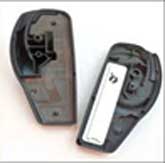| |
|
| |
|
 |
Supply
Chain by the Numbers |
| |
|
| |
- Oct. 2, 2014 -
|
| |
|
| |
|
| |
|
| |
US Soon to be Number 1 in Oil Production; 3PLs are Closing the Dreaded IT Gap; Zara Spending Millions on RFID Tags - but with Plans for Reuse; Diesel Prices Falling Desite Mid-East Turmoil |
| |
|
| |
| |
| |
11.5 Million |

|
|
|
| |
| |
|
500 Million
|
 |
Number of EPC RFID tags that Spanish retailer Zara has order to support its item-level tagging rollout to all of its nearly 2000 stores by 2016. That represents about one-sixth of all tags that will be procured this year for item-level apparel tagging. At a cost of still ten cents or so per chip, that tag buy adds up to a rather significant expense, but unlike other retailers on this same RFID path, Zara has plans to reuse these passive tags. Most retailers have had tags place inside labels or hang tags, where they basically become throwaways after a consumer buys the product. But Zara is having the EPC tags placed inside the plastic housing of the existing Electronic Article Surveillance (EAS) tags it is already using, so that the EPC chips can easily be recycled and assigned to new items back at the DC. We are very close right now to a tipping point for item-level tagging in soft goods retail.
|
| |
| |
|
| |
| |
$3.75 |
|
That's the average on the road price for diesel fuel last week, according to the US Energy Information Administration. That is the lowest level since July of 2012. The last time the average cost of diesel increased in a week was on June 30. Since that time it has fallen every week, except for one week earlier this month when it was unchanged. Over this time it has declined 16.5 cents. All that as turmoil in the Middle East rages on - the days of "geopolitical risk" driving oil prices higher seems to be temporarily over, for whatever reason, which is simply amazing. Despite some swings in oil prices over the past couple of years, the price of diesel has remained remarkably stable, now getting out of its two-year trading range - to the low side, great news for shippers.
|
| |
| |
|
|
|
| |
 |
 |
| |
|
|
| |